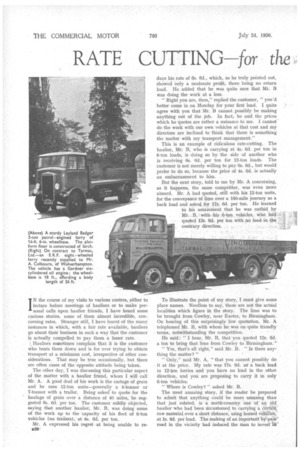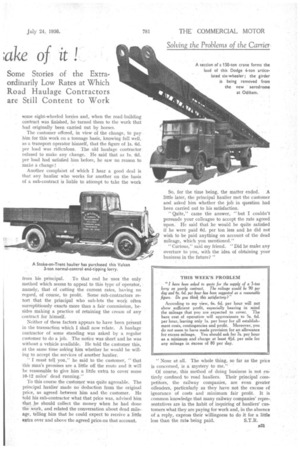RATE CUTTING for the ;ake of it
Page 44

Page 45

If you've noticed an error in this article please click here to report it so we can fix it.
Some Stories of the Extraordinarily Low Rates at Which Road Haulage Contractors are Still Content to Work
IN the course of my visits to various centres, either to lecture before meetings of hauliers or to make personal calls upon haulier friends, I have heard some curious stories, some of them almost incredible, concerning rates, Stranger still, I have learnt of the many instances in, which, with a fair rate available, hauliers go about their business in such a way that the customer is actually compelled to pay them a lesser rate.
! Hauliers sometimes complain that it is the customer Who beats them down and is for ever trying to obtain transport at a minimum cost, irrespective of other considerations. That may be true occasionally, but there are often cases of the opposite attitude being taken.
The other day, I was discussing this particular aspect of the matter with a haulier friend, whom I will call Mr. A. A good deal of his work is the cartage of grain and he uses 12-ton units—generally a 6-tonner or 7-boner with a trailer. Beingasked to quote for the haulage of grain over a distance of 40 miles, he suggested Gs. Gd. per ton. The customer mildly objected, saying that another haulier, Mr. B, was doing some of the work up to the capacity of his fleet of 6-ton vehicles (no trailers), at 4s. 6d. per ton.
Mr. A expressed his regret at being unable to reB30.'
duce his rate of Gs. 6d., which, as he truly pointed out, showed only a moderate profit, there being no return load. He added that he was quite sure that Mr. B was doing the work at a loss.
"Right you are, then," replied the customer, "you'd better come in on Monday for your first load. I quite agree with you that Mr. B cannot possibly be making anything out of the job. In fact, he and the prices which he quotes are rather a nuisance to me. I cannot.' do the work with our own vehicles at that cost and my directors are inclined to think that there is something the matter with my transport management."
This is an example of ridiculous rate-cutting. The haulier, Mr. 13; who is carrying at 4s. 6d, per ton in 6-ton loads, is doing so by the side of another who is receiving 6s. 6d. per ton for 12-ton loads. The customer is not merely willing to pay Gs. Gd., but would prefer to do so, because the price of 4s. Gd. is actually an embarrassment to him.
But the next story, told to me, by Mr. A concerning, as it happens, the same competitor, was even more absurd. Mr. A had quoted, still with his I2-ton units, for the conveyance of lime over a 160-mile journey as a back load and asked for 17s. Gd. per ton. He learned to his amazement that he was outbid by
Mr... B, with volncles, who had quoted 12s. 6d per ton with no load in the contrary direction.
To illustrate the point of my story, I must give some place names, Needless to say, these are not the actual localities which figure in the story. The lime was to be brought from Cowley, near Exeter, to Birmingham. On hearing of this surprisingly low quotation, Mr. A telephoned Mr. B, with whom he was on quite friendly terms, notwithstanding the competition.
He said : "1 hear, Mr. B, that you quoted 12s, 6d. a ton to bring that lime from Cowley to Birmingham."
" Yes, that's all right," said Mr. B. " Is there any. thing the matter? "
"Only," said Mr. A, "that you cannot possibly do it at the price. My rate was 17s. 6d. as a back load in 12-ton lorries and you have no load in the other direction, and you are proposing to carry it in only 6-ton vehicles.
" Where is Cowley?" asked Mr. B.
The most amazing story, if the reader be prepared to admit that anything could be more amazing than that just related, is a northcountry one of an Old. haulier who had been accustomed to carrying a aq.tki4_ raw material over a-short distance, using horsed velliines;: at 1s. 6d. Per load. The making Of an importafit'Vipa14road in the vicinity had induced the man to inirestiff.
some eight-wheeled lorries and, when the road-building contract was finished, he turned them to the work that had originally been carried out by horses.
The customer offered, in view of the change, to pay him for this work on a tonnage basis, knowing full well, as a transport operator himself, that the figure of is. 6d. per load was ridiculous. The old haulage contractor refused to make any change. He said that as is. 6d. per load had satisfied him before, he saw no reason to make a change Another complaint of which I hear a good deal is that any haulier who works for another on the basis of a sub-contract is liable to attempt to take the work from his principal. To that end he uses the only method which seems to appeal to this type of operator, namely, that of cutting the current rates, having no regard, of course, to profit. Some sub-contractors retort that the principal who sub-lets the work often surreptitiously exacts more than a fair commission, besides making a practice of retaining the cream of any contract for himself.
Neither of these factors appears to have been present in the transaction which I shall now relate. A haulage contractor of some standing was asked by a regular customer to do a job. The notice was short and he was without a vehicle available. He told the customer this, at the same time asking him whether he would be willing to accept the services of another haulier.
" I must tell you," he said to the customer, "that this man's premises are a little off the route and it will be reasonable to give him a little extra to cover some 10-12 miles' dead running."
To this course the customer was qUite agreeable. The principal haulier made no deduction from the original price, as agreed between him and the customer. He told his sub-contractor what that price was, advised him that lfe should collect the money when he had done the Work, and related the 'conversation about dead mileage, telling him that he could expect to receive a little extra over and above the agreed price.. on that account.
So, for the time being, the matter ended. A little later, the principal haulier met the customer and asked him, whether the job in question had been carried out to his satisfaction.
"Quite," came the answer, "but I couldn't persuade your colleague to accept the rate agreed upon. He said that he would be quite satisfied if he were paid 6d. per ton less and he did not wish to be paid anything on account of the dead mileage, which you mentioned."
" Curious," said my friend. "Did he make any overture to you, with the idea of obtaining your business in the future? "
"None at all. The whole thing, so far as the price is concerned, is a mystery to me."
Of course, this method of doing business is not entirely confined to 'road hauliers. Their principal competitors, the railway companies, are even greater offenders, particularly as they have not the excuse of ignorance of costs and minimum fair profit. It is common knowledge that many railway companies' reprea sentatives are in the habit of inquiring of hauliers' customers what they are paying for work and, in the absence of a reply, express their willingness to do it for a little
less than the rat & being paid. S.T.R.




























































































